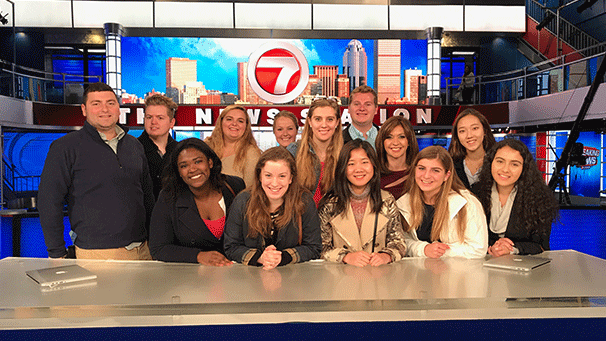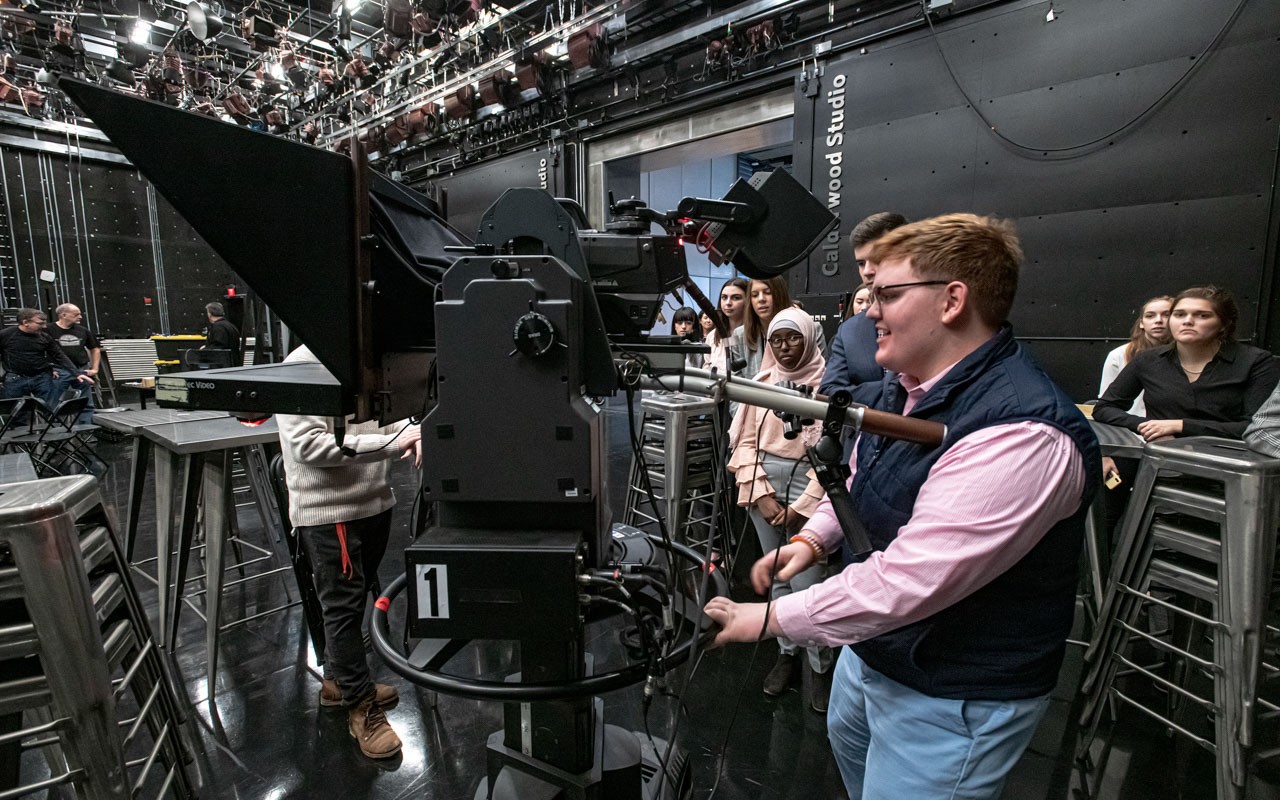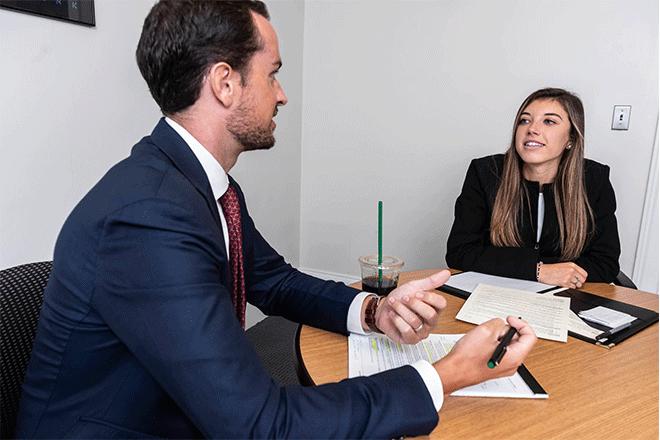Make Meaningful Connections
It's never too early to start building your network. Attending career fairs, reaching out to alumni, and joining mentoring programs can help you learn about new industries, get information to help you prepare for interviews, and establish professional connections.
Networking opportunities present themselves regularly. Take advantage of the resources and advantages available to you as a student to build your network throughout your experience. Don’t wait until you’re actively looking for a job to start making connections. Instead, take action now to grow your network. You can make valuable career connections through a variety of sources, including:
- Your Personal and Professional Relationships
Start by reaching out to your personal relationships (relatives, friends, coaches, mentors, etc.) and professional relationships (colleagues, faculty, supervisors, etc.) to set up exploratory career conversations. Ask your connections to introduce you to members of their extended network.
Exploratory career conversations offer low pressure situations to gather information about various careers by speaking to professionals in those fields. You will learn what types of job opportunities/career paths exist in a given field or organization and begin to develop connections with individuals in your field of interest.
- When reaching out to request an exploratory conversation, make sure you are clear that you are not asking the person for a job. Instead, your aim is to gather information on which to base some decisions.
- If you have been referred by a specific person, mention that early in your message.
- Request a 30-minute meeting at or near each contact's work site to make it convenient for him or her and so that you can experience his or her work environment. You can also offer to take them out for coffee.
- In your initial outreach, state how you found them and why you are reaching out.
- If you can't meet face-to-face, set up a time to "meet" through Eagle Exchange, Google Meet, Zoom or phone.
- Prepare questions to ask ahead of time. In addition to general questions, plan to develop questions specific to the industry, position and organization of the person you are interviewing. It can be helpful to visit the person’s LinkedIn or Eagle Exchange profile to learn more about them and tailor your questions according to their background.
- Be prepared to take the lead in the conversation.
- Dress in professional attire to make a positive impression.
- Respect the person’s time. Be appreciative without being apologetic.
- Recognize that everyone has his/her own attitudes, biases and feelings which must be evaluated within the context of your own skills, strengths, values and interests. By talking to several people, you will gain a variety of opinions.
Make the most of the experience by planning out your questions in advance. Remember, these conversations are not about getting a job. You should not ask directly for an interview or a job.
Questions about your interviewee's career field
- What skills or personal characteristics do you feel contribute most to success in this industry?
- What are the positive/negative aspects of working in this field?
- What are typical entry level jobs? Is there a definite career path in this field? If so, can you describe it?
- What are the most pertinent issues or trends in this field?
- What types of internship opportunities exist in this field?
- What are typical entry-level jobs in this field?
- How did you get into this field?
Questions about your interviewee's organization
- Why did you decide to work for this organization?
- What do you like most about this organization?
- What are the toughest challenges your organization faces?
- How would you describe the culture and climate at your organization (casual, busy, etc.)?
- How does your job fit into the organization or department?
- What are the organization’s core values?
Questions about your interviewee's job and career path
- What are the duties/functions/responsibilities of your job?
- How do you spend a typical day/week?
- What do you find most/least satisfying about your job?
- In what ways is your occupation changing?
- What kinds of problems do you deal with? What kinds of decisions do you make?
- How does your schedulevary? Are there busy and slow times or is the work activity constant?
- What projects have you worked on that have been particularly interesting?
- What particular skills or talents are most essential to be effective in your job? How did you learn these skills?
- How much flexibility do you have in determining how you perform your job?
- In what way did this type of work interest you and how did you get started?
- What jobs and experiences have led you to your present position?
- What were the keys to your career advancement?
Questions about preparing for this career
- How does your work relate to any experiences or studies you had in college?
- What courses do you wish you had taken that would have prepared you?
- If you were a college student again, what would you do differently to prepare you for this job?
- What publications or professional journals do you recommend?
- What skills or experiences are required to get an internship or entry level job in this field?
Wrap-up questions
Is there anyone else you can suggest I contact for additional information?
- Send a thank you email within 24 hours following your meeting.
- If somebody referred you to another contact who was particularly helpful, write to the original person and let them know.
- Keep your contacts updated on your progress. Maintaining your connections is an ongoing process which will help you throughout your career.
- Networking is a mutually beneficial process. If you discover a resource or article that you think one of your contacts would appreciate, pass it along.
- Sending messages via email, Eagle Exchange, or LinkedIn is a good way to establish initial contact, but after that try to schedule an in-person meeting or a phone conversation. A more personal connection offers a better sense of who you are and helps you develop a stronger rapport.
- When using email to make initial contact, send a separate message to each recipient. The more names you put in the "To" field of your message, the less likely recipients are to respond. Personalize each email by, for example, mentioning your most recent conversation with that contact
- Spell-check and proofread all emails. This is especially important if you are using a mobile device with an auto-correct function.
- Don't use informal language, slang, text-message conventions, abbreviations, or emoticons.
- End your message with "Sincerely," followed by your name.
- After meeting with a contact in-person or via video chat, send a thank-you message.
- Keep your contacts up to date on your job search, especially when your contact’s suggestions have resulted in another meeting or an interview.
- Send periodic career updates to your contacts.
Experiential Learning
By participating in experiential learning, you can make valuable connections and gain insights to help you launch a job or internship search.

Overview
A job shadow is a one-day experience where you have the opportunity to follow a working professional throughout their daily activities and learn about their career field. Boston College alumni are often happy to host students for a day. You can also tap into your existing networks, including parents, siblings, or friends, and request to shadow them.
When
Winter, spring, and summer breaks are ideal times to participate in job shadows. If the location is Boston, you can also participate during the school year.
How to Arrange Job Shadows with Alumni:
To arrange your own job shadow, we recommend using Eagle Exchange to connect with BC alumni and request to shadow them for a day. Learn how to easily set up your own job shadow on Eagle Exchange.

Overview
A career trek is a group trip to an organization where you will tour the workplace, learn about potential opportunities, and network with Boston College alumni currently employed at the organization.
When
Career treks happen throughout the academic year.
How to Register
Each career trek will be posted in Handshake under events. Most often there is limited space. We recommend subscribing to receive emails from a career cluster of interest in order to stay updated on upcoming treks.
Additional Opportunities:
Endeavor features career treks as part of the program. The Shea Center for Entrepreneurship runs a TechTrek class.

Overview
An industry chat is a one-on-one conversation with an employer at the Career Center. You will learn how to tailor your job/internship search for a particular industry. You can have your resume reviewed, get advice on how to market your experiences, or practice answering interview questions.
When
Industry chats happen throughout the academic year.
How to Register
Each industry chat will be posted in Handshake under events. Most often there is limited space. We recommend subscribing to receive emails from a career cluster of interest in order to stay updated on upcoming industry chats.
Resources to help you connect

